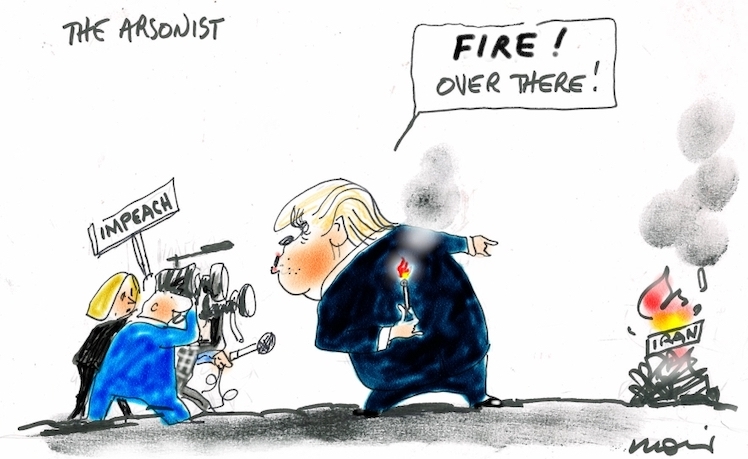Australia’s response to US Trumpeting over the assassination of Iran’s top general, Qassem Suleimani, has been muted. Our Prime Minister has said nothing about whether we agree, in principle, that it is acceptable to assassinate foreign nationals in other countries like the Russians in Britain. Former diplomat, Cavan Hogue, asks if Australia will be dragged into another fine mess.
US policy designed to protect American live and assets has had the opposite effect including on Australia. Trump’s bellicose rhetoric is disturbingly like that of Teddy Roosevelt and George W Bush, both of which led to aggression. Will Australia be dragged into yet another fine mess? This raises questions not just about what interest we have in the Middle East and how we protect them but also leads to heretical thoughts about the value of the American Alliance. We have been found wanting on climate change. Will we also be found wanting on geopolitical change?
Fine articles from Bob Bowker and Mike Scrafton in Pearls and Irritations have examined the details of the current Iran/US imbroglio which, understandably, has tended to be overshadowed in the media by the bushfire crisis. I want to look at some of the more general implications. What does this tell us about American policy and about Australian policy?
Trumped Up: Wiki cables show Australia thinks Iran is not the aggressor
It is hardly news that Trump is unpredictable and has been getting increasingly belligerent. To a large extent, he sees the world through American domestic concerns no doubt including his desire to be reelected. He seems also to be strongly influenced by hawks like Pompeo, Pence and John Bolton. Patriotism of a jingoistic kind is nothing new in the USA. Theodore Roosevelt and the Hearst press spring to mind as an earlier incarnation of emotion driving aggression. The failure of US decision makers to clearly analyse the implications of their actions is also nothing new as the Coalition of the Willing illustrated.
As always, there are American academics, journalists and even politicians who see things more clearly and are publicly critical of their government’s policies and actions but they are not the decision takers. So while the justification for the latest assassination and rhetoric is that it will protect American lives and assets, a number of experienced observers of the Middle East have pointed out that it will have exactly the opposite effect. Will Trump and Murdoch emulate Roosevelt and Hearst? More recently, US policy has been erratic. They supported the Taliban against the USSR without thinking about local reality and longer term factors with predictable results. When Australia was on the Security Council during the Iran-Iraq war, we were constantly urged to support Iran!
An issue which seems to be largely ignored is the question of whether assassination in other sovereign states of people you don’t like is justified. If we accept that, what was, in effect, an attack on another country is justified because the target was a bad guy – as we did in the case of Osama bin Laden – then who decides what is justified? We condemned Russian assassination in Britain of people they presumably saw as a threat but how does that differ in principle? Or is it OK if we do it but not if people we disapprove of do it? So much for the rules based order.

Illustration courtesy www.moir.com.au
Australia has rightly called for all parties to be restrained but has asked Iraq not to kick out Australian troops who are said to be training Iraqis to fight Daesh. Of course if you train other people’s troops you have no say in how they will use that training. We are there, as usual, because the Americans want us there, not because the Iraqis want us there. Having joined in an illegal invasion of Iraq to please the USA we are now stuck with the consequences of that ill-advised action. By leading with our chin publicly, we make it more likely that Australians will be targeted as part of any revenge attacks on the US. Direct criticism of the US action has been absent which would not be the case if a country like China or Russia had done the same thing.
So here we have another example of Australia’s alliance-driven foreign policy. We are putting all our eggs in a somewhat shaky basket. Some praiseworthy efforts have been made by the government to work more closely with our neighbours but this is very much a second prong in our policy. We have been shown to be wanting in our approach to climate change so perhaps it is time to show more imagination on our approach to geopolitical climate change? A thorough and realistic look at our long term interests should start from zero and take nothing for granted. Two minute sound bites are not good enough.
Paul Barratt: Australia should not participate in conflict with Iran
Editor’s Note on deploying troops in other countries:
Australia – no permission needed from Parliament
“Since 1901, neither the Australian Constitution nor Defence legislation has required the government to gain parliamentary approval for the decision to deploy forces overseas or, in the rare cases that it has occurred, to declare war. There have been attempts since 1985 by the Australian Democrats and more recently by the Australian Greens to remove the exclusive power of the government to commit Australia to war.” (More here)
US – requires consultation with Congress
“The War Powers Resolution, enacted in 1973, long after American troops began fighting in Vietnam, required the president to consult with Congress before sending U.S. armed forces into combat unless there already had been a declaration of war. The troops could not stay more than 90 days unless lawmakers backed the decision. The law also sought to give the president “leeway to respond to attacks or other emergencies,” according to the Council on Foreign Relations.” (More here)
UK – convention calls for Parliamentary debate
“In 2011, the Government acknowledged that a convention had emerged whereby the House of Commons would have the opportunity to debate the deployment of military forces, prior to doing so, except in the event of an emergency. The defeat of the Government in a vote on military action in Syria in August 2013 was widely viewed as an assertion of Parliamentary sovereignty on such matters. Yet many have argued that the convention lacks clarity and remains open to interpretation and exploitation.” (More here)
The above article was published in Pearls and Irritations and is republished with permission.
———————
Public support is vital so this website can continue to fund investigations and publish stories which speak truth to power. Please subscribe for the free newsletter, share stories on social media and, if you can afford it, tip in $5 a month.
Cavan Hogue has had a long and distinguished career as an Australian diplomat. He has served in Seoul, Rome, Mexico City and Santiago, as well as Manila and Jakarta. He has been Ambassador to Mexico and Australia’s Deputy Permanent Representative to the United Nations in New York. His last diplomatic appointment was as Australia’s Ambassador to Thailand from 1994 to 1997.

